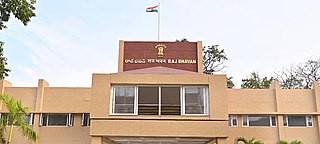
Raj Bhavan, Karnataka is the official residence of the governor of Karnataka located in Bengaluru city, in the State of Karnataka, India. Constructed in the late 19th century.
Raj Bhavan, Mumbai is the official residence of the governor of Maharashtra. It is located on the tip of Malabar Hills, Mumbai.
An official residence is a residence designated by an authority and assigned to an official, and may not always be the same place where the office holder conducts their official functions or lives.

Raj Bhavan is the official residence of the Governor of West Bengal, located in Kolkata, the capital of West Bengal. Built in 1803, it was known as Government House during the Company rule in India and the British Raj.
Raj Bhavan is the official residence of the governor of Uttar Pradesh. It is located in the capital city of Lucknow, Uttar Pradesh.
Raj Bhavan, Haryana is the Raj Bhavan or official residence of the Governor of Haryana, India. It is located in Chandigarh, the shared capital of the states of Haryana and Punjab, on the shore of Sukhna Lake, just north of Punjab Raj Bhavan, residence of the governor of Punjab

Raj Bhavan, formerly Barnes' Court is the official residence of the Governor of Himachal Pradesh. It is located in the capital city of Shimla, Himachal Pradesh.
Raj Bhavan is the official residence of the governor of Kerala. It is located in the capital city of Thiruvananthapuram, Kerala. Built in 1829 as Palace Guest house of Travancore Government Guest, this heritage structure hosts the present governor of Kerala, Arif Muhammad Khan.
Raj Bhavan is the official residence of the governor of Madhya Pradesh. It is located in the capital city of Bhopal, Madhya Pradesh.
Raj Bhavan, Punjab is the Raj Bhavan or official residence of the governor of Punjab. Punjab Raj Bhavan is located in Chandigarh, the shared capital of the states of Punjab and Haryana, on the shore of Sukhna Lake just south of Haryana Raj Bhavan, residence of the governor of Haryana. Since 1985, the governor of Punjab has also acted as the administrator of Chandigarh.

Raj Bhavan, literally the "Governor's Residence," is the official residence of the governor of Tamil Nadu. It is located in Chennai, the capital city of Tamil Nadu.

Raj Bhavan, Dehradun or Governor's House, Dehradun is the official residence of the governor of Uttarakhand. Uttarakhand is one of the few Indian states which have two official buildings of Raj Bhavans. The first one is located in the capital city of Dehradun. The second Raj Bhavan of Uttarakhand is located in Nainital. The current governor of Uttarakhand is Gurmit Singh.
Raj Bhavan is the official summer residence of the Lieutenant Governor of Jammu and Kashmir. It is located in the summer capital city Srinagar, Jammu and Kashmir.

Narinder Nath Vohra, popularly referred as N. N. Vohra, is a retired 1959 batch Indian Administrative Service (IAS) officer of Punjab cadre who was the 12th governor of the Indian state of Jammu and Kashmir. He was the first civilian governor of Jammu and Kashmir in eighteen years after Jagmohan.
An interlocutor is someone who informally explains the views of a government and also can relay messages back to a government.

The Government of Jammu and Kashmir is the governing authority of the Jammu and Kashmir and its two divisions and 20 districts.
Raj Bhavan is the official residence of the governor of Tripura. The incumbent governor of Tripura is Hon'ble Shri Tathagata Roy. The residence is located in the state's capital city of Agartala. A new Raj Bhavan was built and inaugurated in April 2018. The previous Raj Bhavan was built in 1917, and was known as the Pushbanta Palace prior to India's independence. The previous Raj Bhavan edifice is intended to become a museum and research center in honor of King of Tripura, Maharaja Birendra Kishore Manikya.

The second Raj Bhavan or Governor's House of Uttarakhand is located in Nainital, it is the summer retreat of the governor of Uttarakhand. In the pre-Independence era, Nainital served as the summer capital of United Provinces and this building, built like a Scottish castle was christened as the "Government House". Raj Bhavan was built by the British as the residence of the governor of the North-Western Provinces. The beginning of construction of Raj Bhavan started in April 1897 and took two years to complete. It is built on European pattern and based on Gothic architecture. The designers of Raj Bhavan at Nainital were Architect Stevens and the Executive Engineer F. O. W. Ortel. After independence it was renamed as Raj Bhavan.
Raj Bhavan, Jammu and Kashmir may refer to:

Raj Bhavan is the official residence of the governor of Andhra Pradesh. It is located in Vijayawada, Andhra Pradesh, India.







